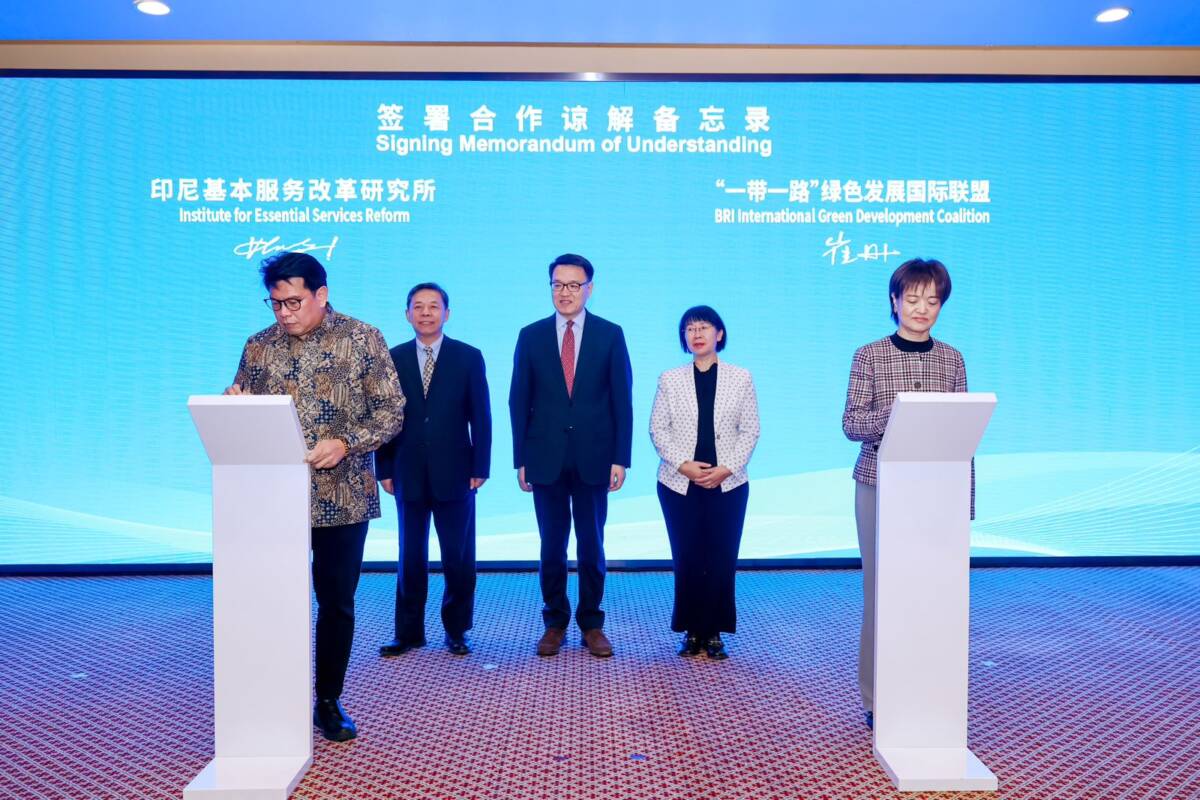IESR Executive Director Fabby Tumiwa (left) and BRIGC Secretary General Ciu Dandan (right) signed a Memorandum of Understanding (MoU) in Beijing, witnessed by the Vice Minister of China’s Ministry of Ecology and Environment.
Beijing, China, December 13, 2024– Strengthening Indonesia’s climate ambitions and accelerating the energy transition require close international collaboration, including with China through the BRI International Green Development Cooperation (BRIGC) framework. BRIGC is a joint initiative led by the Ministry of Ecology and Environment of the People’s Republic of China (MEE) in partnership with international stakeholders.
As a leading think tank in energy and climate transition, the Institute for Essential Services Reform (IESR) views BRIGC as a strategic opportunity to advance renewable energy development in Indonesia. To realize this goal, IESR signed a Memorandum of Understanding (MoU) with BRIGC, formalizing a partnership to promote and support green and low-carbon cooperation under the Belt and Road Initiative (BRI) framework and its projects in Indonesia. The signing ceremony was held in Beijing, China, on December 12, 2024.
Through this MoU, IESR will carry out strategic policy research and analysis, provide policy recommendations, and establish action priorities to enhance green and low-carbon initiatives within the framework of BRI cooperation. Moreover, IESR will leverage the extensive expertise of BRIGC members and partners, both in China and internationally, to provide strategic advise to advance the energy transition and achieve carbon neutrality in Indonesia.
IESR is actively strengthening the partnership between Indonesia and China to support the decarbonization of Indonesia’s energy system and ensure high-quality development. In September 2023, IESR, ClientEarth, and BRIGC conducted a joint study that highlighted China’s role and identified potential areas of cooperation between China and Indonesia in the energy transition. The Chinese government welcomed the study’s recommendations, recognizing its value in deepening the relationship between Indonesia and China.
Fabby noted that past BRI projects have contributed to climate change and environmental pollution. Up until 2021, BRI financing in Indonesia totaled USD 29.55 billion for coal-fired power projects. He stressed the critical need to redirect investments from fossil fuel-based energy development to renewable energy and low carbon technologies.
“We need to shift BRI investment from coal to renewable energy to support Indonesia in achieving carbon neutrality by 2050 or sooner. Indonesia needs to build 15 to 25 GW of renewable energy every year from now until 2050, along with investments in energy storage, grid modernization, and transmission, requiring a cumulative total investment of around USD 1.2 trillion. Investment, financing and technology from China are important sources for Indonesia and to complement with other initiatives, such as JETP, to achieve this target,” said Fabby.
Fabby Tumiwa was also appointed as a member of the BRI Green and Low Carbon Expert Network (GLEN) by the Ministry of Ecology and Environment (MEE) of the People’s Republic of China. President Xi Jinping announced the establishment of GLEN during the third Belt and Road Forum last year. The network consists of 30 experts, including 17 from China and 13 international representatives. GLEN is tasked with advising the Chinese government on greening the BRI and providing expert recommendations to support low-carbon and high-quality development in BRI partner countries.
“I am honored to be part of GLEN and hope my contributions to this network will help shape the BRI’s green vision and support Indonesia and Southeast Asia green infrastructure development. Not just green, BRI projects must be implemented based on principles of equal partnership, respect for human rights, and the resolution of country-specific challenges,” Fabby stated.
IESR hopes that its involvement in BRIGC will strengthen diplomatic and economic relations between Indonesia and China, foster strategic collaboration, support low-carbon projects, attract greater investment in renewable energy, and facilitate access to expertise and innovation to accelerate a just energy transition in Indonesia.

